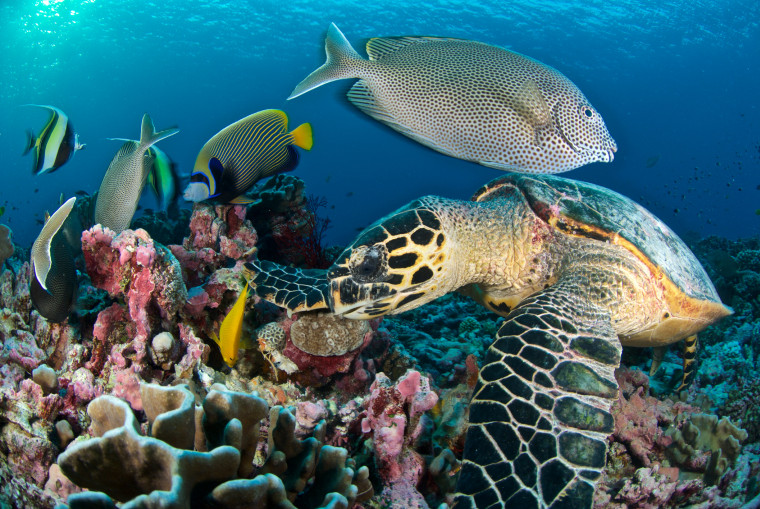Making Waves: Changing the Status Quo for Aquatic Animals
Open gallery

In Part I of this three-part blog series, we shared our insights as to why aquatic animals are ignored and provided some examples of how we as individuals, and society more broadly, treat them poorly and differently than other terrestrial animals. In Part II, we addressed some of the ways regulatory regimes fail aquatic animals, and do not provide them with the protection they deserve. In this final installment, Part III, we dive into some of the work we are doing to change the status quo for aquatic animals, and how anyone can help protect aquatic animals—even from home!
As we have highlighted throughout this series, aquatic animals are some of the most utilized and killed beings on the planet. Despite growing scientific knowledge and understanding of their capacities and qualities, their use is promoted and encouraged—by governments and other stakeholders throughout the world. New utilizations of, and threats to, aquatic animals are increasing exponentially. In addition to these direct threats, their habitats—whether marine or freshwater—are also facing damage and destruction. However, there is reason to be optimistic that the tides are turning.
In parallel to these mounting problems, there are growing efforts to protect and defend aquatic animals and their homes. Dedicated individuals and organizations around the globe are employing their knowledge, skills and resources to make changes—from scientists, to youth, to communities and grassroots organizations, to politicians and policy makers. These invisible aquatic animal victims are becoming more visible; people’s perception and understanding of them are evolving, and alternatives to their uses are being developed and promoted.
How the Aquatic Animal Law Initiative and Animal Law Clinic Are Making a Difference for Aquatic Animals
As legal professionals and law students, the Aquatic Animal Law Initiative (AALI) and the Animal Law Clinic at the Center for Animal Law Studies (CALS), are working to protect and promote the interests of aquatic animals by: (i) advocating on their behalf through the legal system; (ii) promoting their value to the public by providing education about their cognitive, emotional and physiological capacities; and (iii) harmonizing human, animal and environmental interests.
One cornerstone to this work is education, specifically for lawyers and other professionals, but more broadly for all stakeholders. A prime example is the first-of-its-kind law school course on Aquatic Animal Law. This comprehensive course is offered online and covers various facets of aquatic animal law and provides pathways for advocates to protect aquatic animals. This year, the course is being offered as part of CALS’ Animal Law Summer Program. Throughout the year, we also present to audiences around the world at conferences, on webinars, in classes, and at other events. Together with other authors, we are working on the first Aquatic Animal Law Textbook, which focuses on aquatic animals issues within the areas of law, policy, and science.
The work of AALI and the Animal Law Clinic covers all types of aquatic animals in all different contexts—whether they are used for food, in scientific research, kept as companion animals, held in captivity, in their natural habitats, used in medicine and fashion—or the plethora of other ways that humans utilize and impact these creatures.
Some examples of this work includes:
- A research memorandum relating to the regulation of aquaculture in the U.S. (at federal, state and tribal levels with comparisons to other countries’ regulations);
- A draft Humane Aquaculture Slaughter Bill;
- Work on the class action lawsuit challenging the use of mini tanks for betta fish;
- Recommendations for the Green Party in Ireland regarding Marine Protected Areas and Endangered Species protection for certain animals;
- Compiling and summarizing scientific research relating to fishes and other aquatic animals, focusing on their capacities and needs;
- Research and drafting related to state aquaculture regulatory issues and liaising with relevant industry bodies;
- A 50-state survey focusing on legal regulations related to the taking and killing of turtles;
- A 50-state survey summarizing the protections for fishes in the context of anti-cruelty laws; and
- A memorandum summarizing the issues and laws relating to Kenyan aquaculture.
How You Can Get Involved Making a Difference for Aquatic Animals
Given the limited legal protections currently provided to aquatic animals, how can those who care about aquatic animals take action to protect them? All of us can make a difference for aquatic animals and we offer a few ideas of some of the ways below.
A great way to help aquatic animals is to participate and share information about World Aquatic Animal Day on April 3, 2021 (Starting at 8:45am PT, Register here). This is an annual day dedicated to aquatic animals and aimed at raising global awareness about these often forgotten nonhuman animals. This year’s theme is “The Impact of Our Human Activities on Aquatic Animals”. For our first event in 2020, the focus was on “Aquaculture”—the farming of aquatic animal species, and some of the growing issues in this area.
There are a number of opportunities to participate in this year’s Event, including attending one or all of our webinar panels, reading and sharing our resources, including our soon-to-be-released “Resource Packet”, and attending and participating in our Virtual Action Hour or attending the screening of Seaspiracy!
During the Virtual Action Hour (12pm PST), our community partners will provide guidance on how to take specific actions for aquatic animals, and will equip participants with all the tools and resources necessary to do so. We will also share other information and resources on how to take action for aquatic animals—including by signing petitions, using your social media platforms, or reaching out to your representatives. Regardless of how you choose to participate, we encourage you to share our dedicated hashtag #worldaquaticanimalday, so we as a global community can see what others are doing on the day!
Another way to make a difference is to educate yourself about the many other positive efforts and developments in the field. Whether it is increasing scientific research and publications that explain the sentience and capacity of aquatic animals; new undercover investigations; emerging litigation; new documentaries helping people understand the natural lives of aquatic animals (or our impacts on them); the rising number of events and conferences dedicated to aquatic animals; or otherwise—it is clear that the tide is turning! Together with the growth in alternatives eliminating the need to use these animals, it is becoming increasingly apparent that—not only is it unsustainable to continue our decimation of aquatic life—it is increasingly unnecessary.
A good approach to stay involved and up to date, is to follow and support existing efforts by those working on aquatic animal and habitat protection. There are a plethora of fantastic organizations working on these issues—in every corner of the globe. We encourage you to subscribe to and connect with these organizations— particularly locally—to see how you might assist them with their efforts, or otherwise get involved.
As individuals, there are daily opportunities to help that are easy and fun. Making changes in your personal life can limit the uses and impacts on aquatic animals. One easy option is not to support facilities that exploit or keep aquatic animals captive, such as those purely for entertainment. Consider reducing consumption of aquatic animals and trying one of the many delicious plant-based seafood alternatives available. Soon, you might even be able to try seafood that has been made completely in a laboratory, without many of the problems associated with traditional fishing or aquaculture.
Protecting aquatic environments is essential to protecting animals. While major issues like climate change will take time to address, other issues like pollution at the local level can be more readily and quickly changed. Aquatic animals ingest the chemicals and small materials, such as plastic, that humans release into the oceans. As an individual, purchasing less plastic, recycling and reusing whenever possible, and being more cognizant of how much water and energy goes into making your products will help to protect the rivers, lakes, and oceans that aquatic animals call home. Single-use plastic bans have also begun being successfully implemented around the world, so supporting petitions and representatives that urge adoption of these proposals is extremely helpful.
For some more examples of what you can do, check out our “Ten Ways To Get Involved” document.
Conclusion
Anyone can make a difference for aquatic animals through small actions every day. Slowly but surely, this will be the change we need to save not only aquatic animals, but our oceans, freshwater systems, environment—and ourselves!
While it may seem like such actions are just a tiny drop in a limitless ocean—to which we might respond:
“…what is any ocean, but a multitude of drops?” (David Mitchell, Cloud Atlas)



The Center for Animal Law Studies (CALS) was founded in 2008 with a mission to educate the next generation of animal law attorneys and advance animal protection through the law. With vision and bold risk-taking, CALS has since developed into a world-renowned animal law epicenter, with the most comprehensive animal law curriculum offered anywhere. In addition, CALS is the only program that offers an advanced legal degree in animal law and three specialty Animal Law Clinics, including the Aquatic Animal Law Initiative. CALS is a fully self-funded nonprofit organization operating under the Lewis & Clark College 501(c)(3) tax-exempt status, and is only able to provide these educational opportunities through donations and grants.
More Center for Animal Law Studies Stories
Center for Animal Law Studies is located in Wood Hall on the Law Campus.
MSC: 51
email cals@lclark.edu
voice 503-768-6960
Center for Animal Law Studies
Lewis & Clark Law School
10101 S. Terwilliger Boulevard MSC 51
Portland OR 97219

